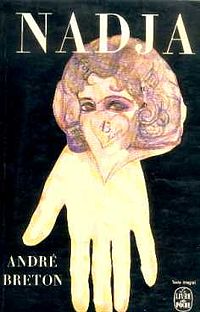- Nadja (novel)
-
Nadja 
Nadja, cover of the 1964 Livre de Poche editionAuthor(s) André Breton Country France Language French Genre(s) Surrealist novel Publisher Grove Press Publication date 1928 Media type Print (Hardback & Paperback) Pages 160 pp ISBN 0-8021-5026-8 OCLC Number 23109462 One of the iconic works of the French surrealist movement, Nadja is the second novel published by André Breton, in 1928. It starts with the question "Who am I?"
It is based on Breton's interactions with an actual young woman (Nadja) over the course of 10 days, and is taken to be a semi-autobiographical description of his relationship with a mad patient of Pierre Janet. The book's non-linear structure is grounded in reality by references to other Paris surrealists such as Louis Aragon, and by 44 photographs.
The last line of the book ("beauty will be CONVULSIVE or will not be at all") provided the title for Pierre Boulez's flute concerto ...explosante-fixe...".
Summary
The narrator, named André, ruminates on a number of Surrealist principles and ideologies, before ultimately commencing (around a third of the way through the novel) on a narrative account, generally linear, of his brief (10-day) affair with the titular character Nadja (whose is named so “because in Russian it’s the beginning of the word hope, and because it’s only the beginning,” but which might also evoke the Spanish ‘Nadie,’ which means ‘No one’). The narrator becomes obsessed with this woman with whom he, upon a chance encounter while walking through the street, strikes up conversation immediately. He becomes reliant on daily rendezvous, occasionally culminating in romance (a kiss here and there). His true fascination with her, however, is her vision of the world, which is often provoked through a discussion of the work of a number of Surrealist artists, including himself. Her understanding of existence subverts the rigidly authoritarian quotidian (and it is later discovered that she is mad and belongs in a sanitarium). After she begins narrating to the narrator over an account filled with too many details over her past life, she in a sense becomes demystified, and the narrator realizes that he cannot continue the relationship.
In the remaining quarter of the text, he distances himself from her corporeal form and descends into a meandering rumination on her absence, such that one wonders if it is more her absence that inspires him than her presence. (It is, after all, the reification and materialization of her as an ordinary person that he ultimately despises and cannot tolerate to the point of inducing tears.) There is something about the closeness once held between the narrator and Nadja that indicated a depth beyond the limits of conscious rationality, waking logic, and sane operations of the everyday—there is something essentially “mysterious, improbable, unique, bewildering” about her, reinforcing the notion that the propinquity serves only to remind him of her impenetrability and her eventual recession into absence is the fundamental concern of this text, such that she may live freely in his conscious and unconscious, seemingly unbridled, maintaining the paradoxical role as both present and absent. With her past instated onto his own memory and consciousness, the narrator feels awakened to an impenetrability of reality, seeing a particularly ghostly residue peeking from under its thin veil. Thus, he might better put into practice his theory of Surrealism, predicated on the dreaminess of the experience of reality within reality itself.
Quotations
- "Don't I love her? When I am near her I am nearer things which are near her."
- "Beauty will be convulsive or will not be at all."
- "He cannot enter, he does not enter."
- "I am obliged to reply that I know nothing about it, that in such matters the right to bear witness seems to me to be all that is granted."
- "You could never see this star as I do. You don't understand: It's like the heart of a heartless flower."
See also
Works by André Breton Fiction Non-fiction Categories:- 1928 novels
- French novels
- Surrealist works
- Works by André Breton
Wikimedia Foundation. 2010.
